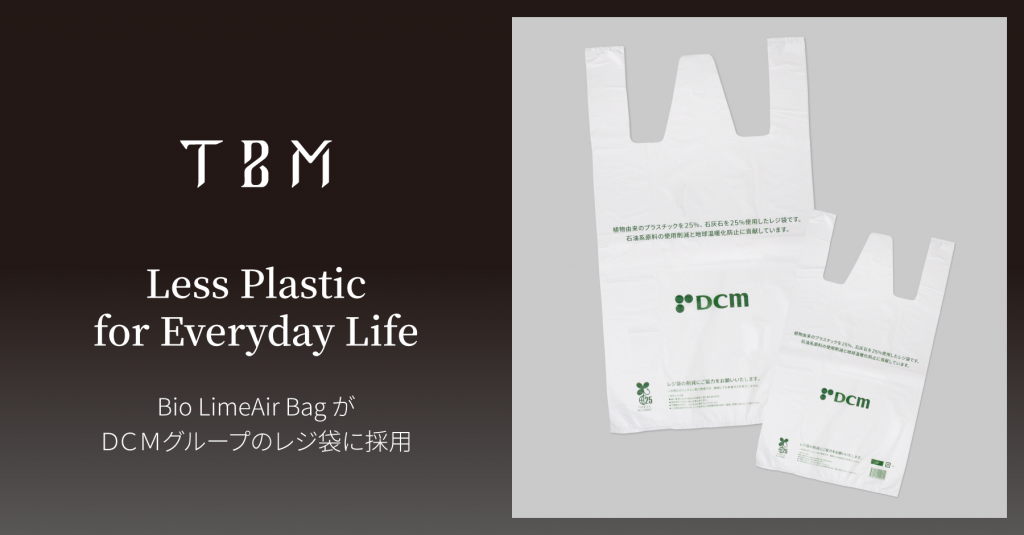プレスリリース
- LIMEX
石灰石と植物由来樹脂を使用した「Bio LimeAir Bag」が、DCMグループのレジ袋に採用
~石油由来プラスチックとCO2排出量を削減、環境負荷低減の取り組みに貢献~

株式会社TBM(本社:東京都千代田区、代表取締役CEO:山﨑敦義、以下TBM)の石灰石を約25%とバイオマスプラスチックを含む袋「Bio LimeAir Bag(バイオ・ライムエアー・バッグ)」がDCM株式会社(本社:東京都品川区、代表取締役社長:石黒靖規、以下DCM)のDCMグループ店舗(DCM・ DCMカーマ・DCMダイキ・DCMホーマック・ DCMサンワ・DCMくろがねやおよびケーヨーデイツー)で使用されるレジ袋に採用されました。2022年8月より順次、店舗での利用が開始されます。
DCMが従来使用していたバイオマスプラスチックを約25%配合した袋をBio LimeAir Bagに切り替えることにより、石油由来プラスチックの使用量を年間約41%、CO₂を含む温室効果ガス排出量を約27%削減できる効果*1が見込まれます。今後TBMは、プラスチック使用の合理化や、脱炭素への取り組みが加速する小売業界において、Bio LimeAir Bagの導入を進めてまいります。
*1 TBMによる概算(原材料調達~焼却処分)。保証値ではなく、製造条件等によって変動の可能性があります。
背景
国内外で使い捨てプラスチックを規制する動きが強まっており、既に127カ国以上*2がレジ袋の使用を制限している他、欧州連合(EU)では使い捨てプラスチックを禁止する法案が可決されています。日本国内でも、プラスチックの資源循環を総合的に推進するための戦略のひとつとして、2020年7月より「レジ袋有料義務化」が義務付けられています。また、2022年4月1日より「プラスチックに係る資源循環の促進等に関する法律」が施行されたことで、プラスチックを使用する事業者は代替素材や再生プラスチックの使用などが求められています。
DCMでは、2020年7月のレジ袋有料化に伴い、それまでのポリエチレン製レジ袋から環境負荷の低いバイオマスプラスチックを約25%配合したレジ袋に切り替え、これまでにレジ袋の使用枚数を85%削減しました。さらに環境負荷の低いレジ袋を検討する中で、Bio LimeAir Bagの環境性能と機能性を評価いただき採用に至りました。
*2 United Nations Environment Programme(2018). Legal Limits on Single-Use Plastics and Microplastics: A Global Review of National Laws and Regulations
Bio LimeAir Bagの3つの特長
BioLimeAir Bagは、石灰石を25%とバイオマスプラスチックを含む袋です。炭酸カルシウムの均一分散技術と空隙コントロール技術の活用により、バイオマスプラスチックを約25%配合した袋と比較し、軽量で環境性能に優れた袋を実現することができました。
特長1 石油由来プラスチックの使用量を削減
Bio LimeAir Bagはバイオマスプラスチックを約25%配合した袋と比較し、石油由来プラスチックの使用量を約41%削減することが可できます。
特長2 CO₂を含む温室効果ガス排出量を削減
Bio LimeAir Bagはバイオマスプラスチックを約25%配合した袋と比較し、原材料調達から処分におけるCO₂を含む温室効果ガス排出量を約27%削減することができます。
特長3 空隙コントロール技術で軽量化を実現
Bio LimeAir Bagはバイオマスプラスチックを約25%配合した袋と比較し、軽量化を実現しています。
